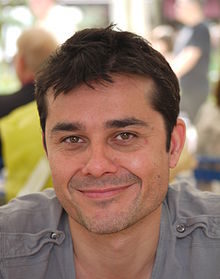The Hay Festival brought together Laurent Binet and Simon Mawer to discuss their novels – HHhH and The Girl Who Fell From the Sky, respectively – which are both based around daring missions from World War II.
Despite the similarity in topic, the two books, and the two authors, aren’t a natural fit.
Young Frenchman Laurent Binet, who rather sweetly walked onto the stage wearing a rucksack, struggles through his reading with his not-great English. At one point, he is given translation-support by his girlfriend who is sitting in the front row – seeing her being of interest to HHhH fans, as Binet litters his novel with references to his partner. His enthusiasm and boyish charm shine through though, and, no doubt, many in the audience will have been enticed to buy his brilliant post-modern novel, which details both the assassination of Nazi Reinhard Heydrich and the author’s writing of the story itself.
Simon Mawer also comes across well, but is rather more of a distinguished gent. His novel sees a female spy parachuted into occupied France to meet a nuclear physicist in Paris.
The event’s Chair summarises the books’ joint themes: World War II, parachutists, heroism, and living undercover, before asking the two about ‘the elephant in the room’ – to what degree are the books truth and to what degree are they fiction?
Laurent Binet tells us that in HHhH he is telling a non-fiction story using the tools of the novel. He says he wanted to go as close to the line of fiction as he possibly could. In the book, where he steps over the line, he quickly owns up in following paragraphs. Binet’s book is full of explanation about why he dislikes standard historical fiction: the pretence of knowing what real people said, felt or did in certain real situations.
A puzzle of HHhH is to what degree Binet really is the unnamed narrator. Binet neatly answers this today by saying the narrator is (to paraphrase) an honest account of how he felt at a certain time and in a certain frame of mind.
Mawer says that what he hopes to do in his book could be seen as the opposite of Binet‘s approach. Mawer tells us that The Girl Who Fell From the Sky is an attempt to use a fictional story to tell a wider essential-truth. The book is based on a degree of fact, but, by getting inside the mind of the story’s protagonist, he has made up thoughts and actions in order to give a true sense of what it was like to live that life. Mawer says he could not have done this in non-fiction. Mawer says ‘Imagination is the prime instinct of a novelist’, and, for him, fiction offers a way of telling certain truths that history books never can.
This blurring of fact and fiction is a central issue in both of these books, even if they take different approaches. It’s also a central issue in literature at large, as highlighted by the number of talks at Hay this year that touched on the issue.
For Mawer, whatever games are played and however fact and fiction are used, the key is the importance of absolute trust in the author: ‘You have got to be able to trust the writer (with where they’re taking you) – it’s almost the definition of a bad novelist if you don’t trust them’, he says.
Laurent Binet and Simon Mawer are both very, very good writers, even if they have quite different approaches to fiction. Both have given us fascinating World War II tales, and both gave the Hay audience plenty to ponder over with regard to the nature of truth in fiction. Ultimately, there is no right or wrong with fiction it seems, only good or bad.
Banner illustration by Dean Lewis












